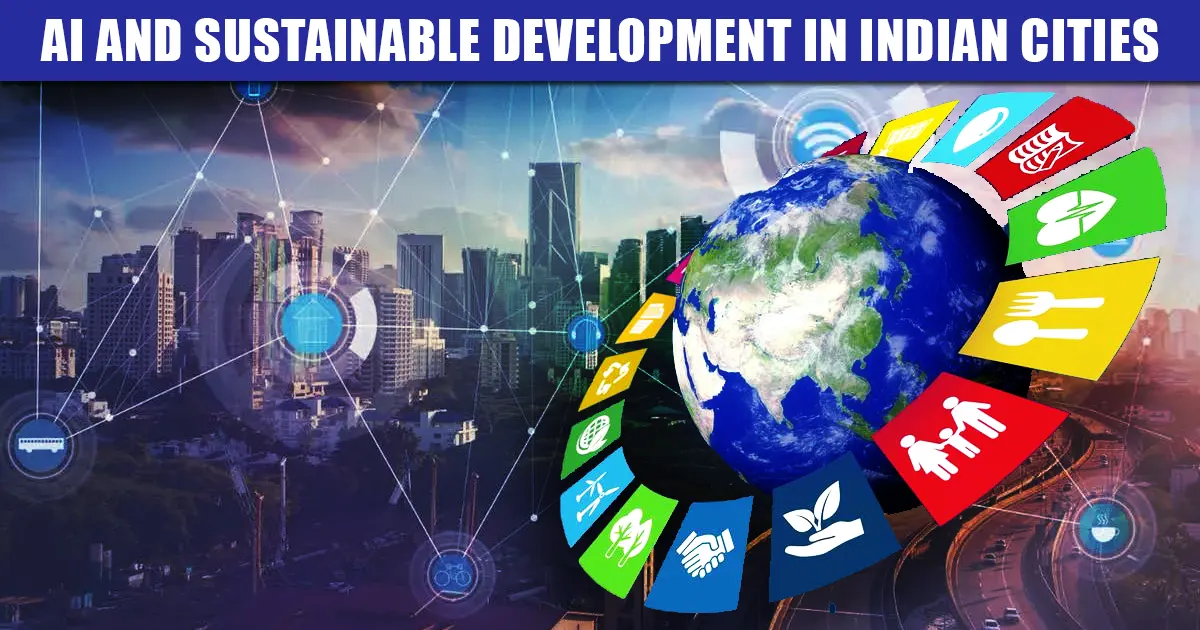
As India’s cities grow rapidly, with an estimated 270 million people expected to live in urban areas over the next two decades, Artificial Intelligence (AI) offers potential solutions for sustainable city management. This aligns with the vision of “Viksit Bharat 2047” for a developed India.
How AI Supports Urban Sustainability
- Data Collection and Management: AI simplifies data gathering from multiple sources, providing real-time, high-quality information for informed city planning and reducing manual labor.
- Predictive and Simulation Models: AI-powered simulations can project the long-term effects of urban planning and zoning changes, helping assess economic, environmental, and developmental impacts.
- Affordable Housing: AI helps optimize land use and forecast housing demand, allowing more efficient, responsive planning for affordable housing.
- Public Transport Improvements: AI enhances last-mile connectivity by integrating data from various modes of transportation, making public transport more convenient and appealing.
- Waste Management: AI streamlines waste sorting, collection route planning, and recycling, reducing the urban waste footprint.
- Healthcare Access: AI analytics identify healthcare gaps, allocate resources more effectively, and optimize emergency response in underserved areas.
- Air Quality Monitoring: Real-time pollution data analysis helps cities act quickly to maintain air quality.
Global Examples of AI in Urban Planning
- Singapore: Uses AI for managing traffic, public services, and energy, contributing to sustainability.
- Barcelona: Applies AI for optimizing transport, waste management, and air quality, creating a citizen-centered smart city.
Government of India Initiatives
- National AI Centers for Sustainability: Established in 2023-24 with a budget of ₹990 crore, these centers focus on AI in agriculture, health, and urban sustainability, promoting the motto “Make AI in India and Make AI work for India.”
- Airawat Consortium: Led by IIT Kanpur, Airawat serves as a national hub for AI in sustainable urban development, focusing on energy efficiency, transit planning, and innovative local governance.
Airawat’s Key Projects
- Energy Networks: AI models improve energy distribution and minimize losses for a sustainable urban energy system.
- Multimodal Transit Planning: AI-enabled platforms support efficient transit, reducing traffic and enhancing urban mobility.
- Digital Twin for Local Governance: Creating digital replicas of city functions enables real-time, data-driven municipal management.
- Air and Water Quality Monitoring: AI-driven, cost-effective systems allow for timely interventions to improve air and water quality.
Industrial Partnerships and Collaborations
- Adani Industries: Supports AI integration for energy distribution in urban areas, crucial for reducing carbon emissions.
- Tata Consultancy Services: Works on models to evaluate the effects of land-use changes on sustainability, such as flood risk and air quality.
- eGovernance Foundation: Co-develops the DIGIT platform for modern urban governance, aligned with Airawat’s objectives.
- Ministry of Housing and Urban Affairs: Oversees Airawat to ensure it aligns with national urban sustainability goals.
Challenges and India’s Vision
- Balancing Growth and Sustainability: As India aims for rapid economic growth, it must balance urban development with environmental preservation to avoid future demographic and ecological challenges.
- Vision of Global Leadership (Vishwaguru): India’s commitment to sustainable development could set a global example, positioning the nation as a leader in sustainable and inclusive growth.




